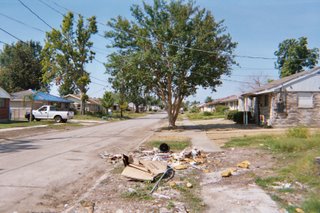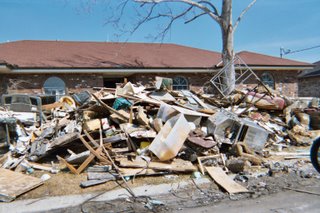Rep. Charles Rangel, D-N.Y. is again proposing the idea that the U.S. government institute a draft. Typical of a politician, Mr. Rangel's proposal to solve a political problem is for citizens to cede their freedom. The only way, it seems, to prevent Rangel and his cohorts from being tempted into starting unnecessary wars is for young people in this country to be treated as serfs.
There are less insidious means to prevent war. How about a constitutional amendment that would require a two-thirds majority of both Houses of Congress to send troops overseas for any reason. Or we could hit them where it hurts with an amendment that would prevent any Congressman who voted to go to war from running for reelection for the duration of that war.
BTW, how is making it easier for government to mobilize a massive armed force a deterrent for war-making?
Why is it that a politician's solution to every problem is to abrogate the freedom of citizens?
Update: Here is Don Boudreaux's brilliant take on the matter.
Monday, November 20, 2006
Sunday, October 08, 2006
The Curse of A-Rod
I don't believe in God, fate, or curses. I believe that everything has a logical explanation, even if that explanation may not be currently known. I scoff at praying, reliance on good luck charms, and silly rituals that are performed to bring about good luck. And it irritates me to no end when athletes thank God for success. Why even go out onto the field if God has somehow ordained you or your team to win?
Having said all that, I am beginning to believe that the New York Yankees are cursed, and that the source of this evil misfortune is their acquisition of Alex Rodriguez, arguably the best player in baseball, almost three years ago. That acquisition came only after the Boston Red Sox attempted in vain to get Rodriguez, and even hockey fans know what happened the last time the best player in baseball went from Boston to New York. I believe now that the deal to get Rodriguez was the true reversal of the Curse of the Bambino. The 2004 post-season collapse of the Yankees was the final nail in the Babe's coffin - and the first pin in the Yankees voodoo doll.
I know that the Yankees hadn't won the World Series before A-Rod joined the team, but at least in 2001 and 2003 there was some fight in the team. The 2004 series with Boston, in contrast, was disgusting to say the least, and the last two Octobers have been pitiful. I saw no fight in the team this past weekend against Detroit, no sense of urgency, no will to win. Detroit, on the other hand, looked like they were on a mission - the way the Yankees of the late '90s looked.
Getting rid of Joe Torre will not be the answer, especially if his replacement is, as is rumored, Lou Pinella - who is too much of a nut bag for my tastes. No, A-Rod must go because the team seems to be taking on his nonchalant attitude, which is not the proper mind-set for October. I know he has a no-trade clause in his contract, but someone needs to convince him that it would be best for all parties if he got out of New York.
One good thing that I saw this year was that Yankee management didn't get rid of some good young players when things were going rough early on. I look forward to watching Robinson Cano and Melky Cabrera mature as players over the next several years as Derek Jeter's career winds down. And I sure hope the talk about Philip Hughes isn't just a lot of hype.
Curses aren't real (I keep repeating to myself), and the problems with the Yankees probably have more to do with team chemistry and starting pitching (or the lack thereof). But for a baseball fan and a fan of history, the Reversed Curse is a better story.
Having said all that, I am beginning to believe that the New York Yankees are cursed, and that the source of this evil misfortune is their acquisition of Alex Rodriguez, arguably the best player in baseball, almost three years ago. That acquisition came only after the Boston Red Sox attempted in vain to get Rodriguez, and even hockey fans know what happened the last time the best player in baseball went from Boston to New York. I believe now that the deal to get Rodriguez was the true reversal of the Curse of the Bambino. The 2004 post-season collapse of the Yankees was the final nail in the Babe's coffin - and the first pin in the Yankees voodoo doll.
I know that the Yankees hadn't won the World Series before A-Rod joined the team, but at least in 2001 and 2003 there was some fight in the team. The 2004 series with Boston, in contrast, was disgusting to say the least, and the last two Octobers have been pitiful. I saw no fight in the team this past weekend against Detroit, no sense of urgency, no will to win. Detroit, on the other hand, looked like they were on a mission - the way the Yankees of the late '90s looked.
Getting rid of Joe Torre will not be the answer, especially if his replacement is, as is rumored, Lou Pinella - who is too much of a nut bag for my tastes. No, A-Rod must go because the team seems to be taking on his nonchalant attitude, which is not the proper mind-set for October. I know he has a no-trade clause in his contract, but someone needs to convince him that it would be best for all parties if he got out of New York.
One good thing that I saw this year was that Yankee management didn't get rid of some good young players when things were going rough early on. I look forward to watching Robinson Cano and Melky Cabrera mature as players over the next several years as Derek Jeter's career winds down. And I sure hope the talk about Philip Hughes isn't just a lot of hype.
Curses aren't real (I keep repeating to myself), and the problems with the Yankees probably have more to do with team chemistry and starting pitching (or the lack thereof). But for a baseball fan and a fan of history, the Reversed Curse is a better story.
Monday, August 28, 2006
Wealth and poverty
To the Raleigh News & Observer
In her article “Rethinking welfare – again,” Felicia Kornbluh states that “[John K.] Galbraith and [Milton] Friedman knew that our economy creates wealth and poverty at the same time.” This is a seriously flawed view of the economy with which I am sure Milton Friedman would not agree.
The natural state of man is poverty, and only through production and trade does man create wealth. The “economy” creates nothing and is just an abstraction of individuals engaging in those activities. To truly fight poverty we must encourage new wealth creation, not confiscate existing wealth from its creators for redistribution.
Monday, August 07, 2006
Monday, July 24, 2006
Signs, signs

The Town of Cary is getting a lot of flack from citizens over the new signs that are popping up all over town. There have been many letters written to the News & Observer complaining about how unsightly these signs are, and about how they are a big waste of the taxpayers' money.
One interesting theme that has appeared in more than a few letters is the complaint that the town is being hypocritical by putting up these garish signs while banning most signs for commercial purposes. Whether these letter writers understand it or not they are criticizing a fundamental aspect of the relationship between government and the governed.
Does anyone (other then libertarians) question the power of government to tax? If it is wrong for individuals to take money from others without consent, how can the government do it? Granted, with regards to the sign issue, we are not comparing apples to apples, but the point is that government has the power to do things that no individual or group is allowed to do. Why? Read the sign above and think about all that it implies.
Ostensibly, one of the functions of these signs is to warn drivers about upcoming traffic problems. If this is the case then the sign that is a block from my house is facing the wrong way! It can be viewed when traveling north on Kildaire Farm Road, but at this spot it is southbound traffic that tends to be the problem. Every evening at rush hour traffic flowing south backs up for blocks, turning the road into Kildaire Farm Cluster F*%$. Even if the sign was facing the right way, I don't see what good it would do. There aren't many alternate routes drivers could take once they are able to see the sign.
The only thing that has appeared on the sign near my house is a reminder to buckle up, and how they can make you.
Thursday, July 20, 2006
Saturday, July 08, 2006
Tarheels on ice
[N.B.: the writer of this article hates hockey.]

I HATE HOCKEY! Ok, ok, it's wonderful that the Carolina Hurricanes won Lord Stanley's Cup, but can we get over it? I mean, what is the big deal about winning the championship of a game that is played by Canadian ice skaters with bad hair cuts, and fewer teeth than a native of Appalachia? And why do we want a trophy whose name sounds like a piece of athletic equipment worn by a Member of Parliament? I say!
My ire has been stirred up because of all those damn twits with the Hurricanes' flags on their cars weeks after the finals have completed. Please don't tell me you are so hard up for a major league championship that you will accept it from a team made up of dorky-looking hosers who couldn't tell the difference between North Carolina BBQ and a Philly cheesesteak. Eh?
So why do I hate hockey so much? Because it is too much like soccer which is the athletic equivalent to John Tesh music - you're always expecting something to happen and it never does. It's extremely frustrating to watch a "sport" where the ball/puck continually changes hands/feet/stick (whatever!) for three hours until some canuk/Pele gets a lucky shot on goal. I'll bet TV viewers sleep through most of the goals scored, hoping to catch the "highlights" on SportsCenter. Any sport that has two columns for loses in a team's standings is asking to be ridiculed. I guess it's better than having four columns in the standings.
which is the athletic equivalent to John Tesh music - you're always expecting something to happen and it never does. It's extremely frustrating to watch a "sport" where the ball/puck continually changes hands/feet/stick (whatever!) for three hours until some canuk/Pele gets a lucky shot on goal. I'll bet TV viewers sleep through most of the goals scored, hoping to catch the "highlights" on SportsCenter. Any sport that has two columns for loses in a team's standings is asking to be ridiculed. I guess it's better than having four columns in the standings.

And what the hell is icing anyway? I thought this was a sport not a baking contest.
Sports pundits were claiming that fans wouldn't return to the game after last year's lockout. Ha! Sports fans are like dogs, it doesn't matter how long you are gone, when you come back they will piss all over the carpet with excitement that you have returned.
 I guess this is the end result of the yankee invasion over the past decade and a half (damn carpetbaggers!). Let's just hope that this gets flushed out of our system by the time ACC basketball season starts.
I guess this is the end result of the yankee invasion over the past decade and a half (damn carpetbaggers!). Let's just hope that this gets flushed out of our system by the time ACC basketball season starts.

I HATE HOCKEY! Ok, ok, it's wonderful that the Carolina Hurricanes won Lord Stanley's Cup, but can we get over it? I mean, what is the big deal about winning the championship of a game that is played by Canadian ice skaters with bad hair cuts, and fewer teeth than a native of Appalachia? And why do we want a trophy whose name sounds like a piece of athletic equipment worn by a Member of Parliament? I say!
My ire has been stirred up because of all those damn twits with the Hurricanes' flags on their cars weeks after the finals have completed. Please don't tell me you are so hard up for a major league championship that you will accept it from a team made up of dorky-looking hosers who couldn't tell the difference between North Carolina BBQ and a Philly cheesesteak. Eh?
So why do I hate hockey so much? Because it is too much like soccer
 which is the athletic equivalent to John Tesh music - you're always expecting something to happen and it never does. It's extremely frustrating to watch a "sport" where the ball/puck continually changes hands/feet/stick (whatever!) for three hours until some canuk/Pele gets a lucky shot on goal. I'll bet TV viewers sleep through most of the goals scored, hoping to catch the "highlights" on SportsCenter. Any sport that has two columns for loses in a team's standings is asking to be ridiculed. I guess it's better than having four columns in the standings.
which is the athletic equivalent to John Tesh music - you're always expecting something to happen and it never does. It's extremely frustrating to watch a "sport" where the ball/puck continually changes hands/feet/stick (whatever!) for three hours until some canuk/Pele gets a lucky shot on goal. I'll bet TV viewers sleep through most of the goals scored, hoping to catch the "highlights" on SportsCenter. Any sport that has two columns for loses in a team's standings is asking to be ridiculed. I guess it's better than having four columns in the standings.
And what the hell is icing anyway? I thought this was a sport not a baking contest.
Sports pundits were claiming that fans wouldn't return to the game after last year's lockout. Ha! Sports fans are like dogs, it doesn't matter how long you are gone, when you come back they will piss all over the carpet with excitement that you have returned.
 I guess this is the end result of the yankee invasion over the past decade and a half (damn carpetbaggers!). Let's just hope that this gets flushed out of our system by the time ACC basketball season starts.
I guess this is the end result of the yankee invasion over the past decade and a half (damn carpetbaggers!). Let's just hope that this gets flushed out of our system by the time ACC basketball season starts.
New Orleans, Part Three - St. Bernard Parish
St. Bernard Parish, which lies southeast of New Orleans, was devastated by Hurricane Katrina. Driving through the area nine months after the fact the neighborhoods seem like ghost towns, and the occasional person you see looks defeated and tired. We stopped and talked to one lady who was outside her house getting rid of the weeds in her yard (she felt she had to do something). Her husband had died not long after the hurricane and she was not sure what she was going to do. As we were talking to her I could see the inside of her house - it was completely gutted.
Here are some pictures of the area.



My aunt lived in this area for 40 years and some of her children settled here as well. Here is a picture of her house. Luckily the X on the door had a zero in the lower quadrant.



FEMA trailers are a common site throughout the city.

But there are some signs of life in the area. A common theme throughout is "We're coming back."

Part 1 | Part 2
Here are some pictures of the area.



My aunt lived in this area for 40 years and some of her children settled here as well. Here is a picture of her house. Luckily the X on the door had a zero in the lower quadrant.



FEMA trailers are a common site throughout the city.

But there are some signs of life in the area. A common theme throughout is "We're coming back."

Saturday, July 01, 2006
Environmentalism done right
Here's an article from the San Jose Mercury News about how two environmental groups are protecting the environment the right way - via the market process. The gist is that the groups are purchasing fishing permits from fisherman in an attempt to protect the seafloor off the California coast. Rod Fujita, a marine ecologist with Environmental Defense in Oakland, states is well by saying "People respond to economic incentives. The solution is not to blame or punish them but to provide incentives for stewardship, not exploitation."
HT Cantillon's Paradise
HT Cantillon's Paradise
Wednesday, June 28, 2006
New Orleans, Part Two - The Line
I thought I would share some of the pictures I took while I was in New Orleans earlier this month. Sorry for the poor quality, but I forgot my digital camera and had to buy some disposable cameras and have the pictures burned to a CD.
Throughout the city there is dark line that marks a lot of the buildings and structures. That line, of course, is where the water stood for several days if not weeks. The picture below is looking north on Tulane Avenue outside of my uncle's restaurant (about a mile from downtown). You can see the line wrapping around the white building. You can't make it out in this picture but that line goes all the way down the street.

This next one is at the same place but turned around (facing south). My uncle's restaurant is the white building in the middle. You can definitely see the line starting on the right side of the picture go right down the street.

It is pretty incredible considering that this spot is about 4.5 miles from Lake Pontchartrain. The river is closer but, of course, the river wasn't a problem.
The next two are of a strip mall about half a mile from the lake. My wife and I used to live near here and this is where we would "make groceries" (grocery shopping to the non-New Orleanian). Here you can see the line going around the entire mall.

And finally, here are a couple of houses that are near the infamous 17th Street Canal levee breach.


More to come.
Part One
Throughout the city there is dark line that marks a lot of the buildings and structures. That line, of course, is where the water stood for several days if not weeks. The picture below is looking north on Tulane Avenue outside of my uncle's restaurant (about a mile from downtown). You can see the line wrapping around the white building. You can't make it out in this picture but that line goes all the way down the street.

This next one is at the same place but turned around (facing south). My uncle's restaurant is the white building in the middle. You can definitely see the line starting on the right side of the picture go right down the street.

It is pretty incredible considering that this spot is about 4.5 miles from Lake Pontchartrain. The river is closer but, of course, the river wasn't a problem.
The next two are of a strip mall about half a mile from the lake. My wife and I used to live near here and this is where we would "make groceries" (grocery shopping to the non-New Orleanian). Here you can see the line going around the entire mall.


And finally, here are a couple of houses that are near the infamous 17th Street Canal levee breach.


More to come.
Tuesday, June 27, 2006
The games people played
As you can see in the side bar I am currently reading Barbara Tuchman's A Distant Mirror: The Calamitous 14th Century. It is a really good read, although a bit difficult at times because there is so much information. I thought I'd share some of the more interesting bits as I came across them. Here is something that really stood out as a bit strange:
That last part about the "untender medieval infancy" refers to something mentioned previously in the book about how children were of little concern to medieval society. I'll talk about that some other time.
In village games, players with hands tied behind them competed to kill a cat nailed to a post by battering it to death with their heads, at the risk of cheeks ripped open or eyes scratched out by the frantic animal's claws. Trumpets enhanced the excitement. Or a pig enclosed in a wide pen was chased by men with clubs to the laughter of spectators as he ran squealing from the blows until beaten lifeless. Accustomed in their own lives to physical hardship and injury, medieval men and women were not necessarily repelled by the spectacle of pain, but rather enjoyed it. The citizens of Mons bought a condemned criminal from a neighboring town so that they should have the pleasure of seeing him quartered. It may be that the untender medieval infancy produced adults who valued others no more than they had been valued in their own formative years.Wow! And people think Grand Theft Auto is morally degrading!
That last part about the "untender medieval infancy" refers to something mentioned previously in the book about how children were of little concern to medieval society. I'll talk about that some other time.
Saturday, June 24, 2006
Re: More wage bunkum
The News & Observer had a letter to the editor today referencing this article of mine. The writer agreed with my point about the need for increased production and used it to justify replacing the income tax with a consumption tax. His basic point being that such a tax will "enhance economic growth." While I am glad he used my argument to justify the need for economic growth, I don't agree with him that a consumption tax will accomplish that goal.
There are economic reasons why a consumption tax will end up being a tax on incomes, thereby negating some of the benefits that the letter writer claims. But the bigger problem I see with his proposal is that it is, as he claims, revenue-neutral. Why would we want it to be revenue-neutral? Why would we want the government to continue to confiscate so much from the private economy?
The issue that we should be addressing is not the type of taxation, but the level of taxation. The more the government takes out of the private economy the more economic growth is hindered, and changing to a "revenue-neutral" consumption tax would do nothing to solve this problem. The government would continue to consume economic resources that would be better left in private hands.
Calling the consumption tax the "Fair Tax" is silly because it would end up not being fair. We are still dealing with politicians who would do their level best to make sure certain products and certain constituents would be exempt from the tax. I can see the debate in Congress now over taxing two ply toilet paper higher than single ply because the rich use more plies.
If I had to choose between a progressive income tax with a small limited government and a consumption tax with the current behemoth, I would choose the former.
There are economic reasons why a consumption tax will end up being a tax on incomes, thereby negating some of the benefits that the letter writer claims. But the bigger problem I see with his proposal is that it is, as he claims, revenue-neutral. Why would we want it to be revenue-neutral? Why would we want the government to continue to confiscate so much from the private economy?
The issue that we should be addressing is not the type of taxation, but the level of taxation. The more the government takes out of the private economy the more economic growth is hindered, and changing to a "revenue-neutral" consumption tax would do nothing to solve this problem. The government would continue to consume economic resources that would be better left in private hands.
Calling the consumption tax the "Fair Tax" is silly because it would end up not being fair. We are still dealing with politicians who would do their level best to make sure certain products and certain constituents would be exempt from the tax. I can see the debate in Congress now over taxing two ply toilet paper higher than single ply because the rich use more plies.
If I had to choose between a progressive income tax with a small limited government and a consumption tax with the current behemoth, I would choose the former.
Wednesday, June 21, 2006
Yoda origami
Not that I am into origami, but I may have to try this.
Update: "Do or do not. There is no try." My ass!
Update: "Do or do not. There is no try." My ass!
Tuesday, June 20, 2006
Bad medicine
This article is another example of why we don't want a socialized healthcare system in this country. Many advocates of such a system point to Canada and Great Britain as models for us to follow, but they consistently ignore the serious problems those systems face. Long waits and rationing are fundamental aspects of any socialized system, be it limited to healthcare or imposed on an entire economy.
I know, I know, the system in America has serious problems as well. But those who claim that our system is deficient because of its reliance on the free-market ignore (a) the massive amount of regulation that is imposed on the healthcare industry, and (b) the distorting effects of Medicare and Medicaid.
I know, I know, the system in America has serious problems as well. But those who claim that our system is deficient because of its reliance on the free-market ignore (a) the massive amount of regulation that is imposed on the healthcare industry, and (b) the distorting effects of Medicare and Medicaid.
Monday, June 19, 2006
More wage bunkum
I sent the following to the Raleigh News & Observer:
In "Paycheck parity" you praise the N.C. General Assembly for raising the state's minimum wage, stating that "struggling workers will benefit from the money." This is a very simplistic view of a more complex economic reality.
The redistribution of little green pieces of paper will do nothing, in the long run, to increase the standard of living of the people you intend to help. Only by increasing the production of goods and services can real wealth be created for the masses, and raising the minimum wage, all things being equal, does nothing to achieve this goal. As the economist Henry Hazlitt said, "The best wage rates for labor are not the highest wage rates, but the wage rates that permit full production, full employment and the largest sustained payrolls."
Sunday, June 18, 2006
The price of security
When defending the Bush administration's NSA domestic spying program many Conservatives state that the security of the country is at stake, and that we must make certain sacrifices in this time of war. I ran across this quote from Wilhelm Röpke that I thought was apropos
The desire for security, while in itself natural and legitimate, can become an obsession which ultimately must be paid for by the loss of freedom and human dignity—whether people realize it or not. In the end, it is clear that whoever is prepared to pay this price is left neither with freedom and dignity nor with security, for there can be no security without freedom and protection from arbitrary power. Surely, every single one of us must then realize that security is one of those things which recede further and further away the more unrestrainedly and violently we desire it.
Tuesday, June 13, 2006
New Orleans, Part One
Last week I was down in New Orleans visiting family for the first time since hurricane Katrina hit the area. It was definitely a mess, but I saw a lot of people cleaning up and rebuilding. I will share some stories and pictures later this week, but I wanted to address a question I was asked regarding my political philosophy.
A friend asked me whether or not my political beliefs were challenged after seeing the utter devastation and the obvious need of those who lost everything. Now, if it isn't obvious already, I am a staunch libertarian (bordering on anarcho-capitalist), and believe that government has no business providing charity of any kind. I think Grover Cleveland's words say it best
So, have my beliefs been challenged? In a word, no. In fact, the question is predicated on, what I consider to be, a false assumption: that only government can provide solutions to such problems. (The person who asked me this question is a libertarian himself, so I don't think this is what he believes. I have, however, been asked similar questions by non-libertarians).
Read this story about how $1.4 billion dollars was wasted on fraudulent charges and tell me that government is the most efficient provider of relief funds. This isn't some anomaly either - we constantly hear about fraud in programs like Medicaid, Social Security, Defense Department appropriations, etc. Why would we think that allowing the government to provide billions in disaster relief would be run any better?
We also have to look at the moral hazard that occurs when government becomes the primary supplier of charity. In the passage above, Grover Cleveland talks about the "expectation of paternal care" that is encouraged when Federal aid is so easily dispersed. We should want to "strengthen the bond of a common brotherhood" with the application of private, personal charity, not sit back and assume that some monolithic entity will know what is best for the vast numbers who have lost everything.
Visiting New Orleans has done nothing to change my philosophy. In fact, after listening to personal stories and watching the local news, I am more convinced that the heavy, bumbling hand of government is the bane of civilized society.
A friend asked me whether or not my political beliefs were challenged after seeing the utter devastation and the obvious need of those who lost everything. Now, if it isn't obvious already, I am a staunch libertarian (bordering on anarcho-capitalist), and believe that government has no business providing charity of any kind. I think Grover Cleveland's words say it best
I can find no warrant for such an appropriation [federal aid to drought-stricken Texas farmers] in the Constitution, and I do not believe that the power and duty of the General Government ought to be extended to the relief of individual suffering which is in no manner properly related to the public service or benefit...The friendliness and charity of our countrymen can always be relied upon to relieve their fellow-citizens in misfortune...Federal aid in such cases encourages the expectation of paternal care on the part of the government and weakens the sturdiness of our national character, while it prevents the indulgence among our people of that kindly sentiment and conduct which strengthen the bond of a common brotherhood.No politician today would have the nerve to say such a thing. Instead, we get a gaggle of rogues who stumble over themselves in a race to place blame on each other and to siphon funds from the public trough.
So, have my beliefs been challenged? In a word, no. In fact, the question is predicated on, what I consider to be, a false assumption: that only government can provide solutions to such problems. (The person who asked me this question is a libertarian himself, so I don't think this is what he believes. I have, however, been asked similar questions by non-libertarians).
Read this story about how $1.4 billion dollars was wasted on fraudulent charges and tell me that government is the most efficient provider of relief funds. This isn't some anomaly either - we constantly hear about fraud in programs like Medicaid, Social Security, Defense Department appropriations, etc. Why would we think that allowing the government to provide billions in disaster relief would be run any better?
We also have to look at the moral hazard that occurs when government becomes the primary supplier of charity. In the passage above, Grover Cleveland talks about the "expectation of paternal care" that is encouraged when Federal aid is so easily dispersed. We should want to "strengthen the bond of a common brotherhood" with the application of private, personal charity, not sit back and assume that some monolithic entity will know what is best for the vast numbers who have lost everything.
Visiting New Orleans has done nothing to change my philosophy. In fact, after listening to personal stories and watching the local news, I am more convinced that the heavy, bumbling hand of government is the bane of civilized society.
Saturday, June 03, 2006
Minimum wage bunkum
Yesterday, the News & Observer had an article praising the North Carolina Legislature for passing an increase in the minimum wage. At one point they say "a raise might enable some of those workers to buy more goods and services themselves, thus stimulating the economy for everyone." Typical of the N&O they fail to see the total effect of this policy.
Increasing the minimum wage, all things being equal, does nothing to increase the supply of goods and services. So, the increased consumption which they consider a benefit will actually have the effect of increasing demand for the current supply of goods and services, thereby putting an upward pressure on prices. In the end those people who the policy intends to help will have higher nominal wages, but their real wages will be the same or lower.
We should be looking to increase real wages by increasing the supply of goods and services, which will put downward pressure on prices. Raising costs for producers will do nothing to achieve this goal.
Increasing the minimum wage, all things being equal, does nothing to increase the supply of goods and services. So, the increased consumption which they consider a benefit will actually have the effect of increasing demand for the current supply of goods and services, thereby putting an upward pressure on prices. In the end those people who the policy intends to help will have higher nominal wages, but their real wages will be the same or lower.
We should be looking to increase real wages by increasing the supply of goods and services, which will put downward pressure on prices. Raising costs for producers will do nothing to achieve this goal.
Thursday, June 01, 2006
Enron and deregulation (or the lack thereof)
Here is a very good article from Spiked on the recent trial of the Enron executives Kenneth Lay and Jeffrey Skilling. Most notably is this quote
This is a key point because many people believe that Enron is the posterchild for deregulation. The fact is that recent waves of deregulation have actually been cases of re-regulation - changing the regulatory framework, not abolishing it.
The article does a good job dispelling other myths, as well.
"Enron might have made free-market noises, but as its forays into international expansion – backed by the Clinton administration – show, it sought state help whenever it could get it. And in California, Enron took advantage of the electricity market precisely because it was still significantly regulated and had anomalies it could exploit."
This is a key point because many people believe that Enron is the posterchild for deregulation. The fact is that recent waves of deregulation have actually been cases of re-regulation - changing the regulatory framework, not abolishing it.
The article does a good job dispelling other myths, as well.
Tuesday, May 30, 2006
Playing the game
As an advocate of the free-market it saddens me to read things like this article on Internet gambling legislation. Now, it's not so much that Congress is trying to prohibit nothing more than a mere vice - I expect such things from those who see it as their duty to mold the masses into good little citizens.
What really saddens me about this article is the following quote from the gaming industry representative
Now I am not so naive to think that this is the first time such a thing has occurred. This happens more often than most people think. In fact, in the so-called Progressive Era this sort of thing happened all the time. What the gaming association wants is for its members to be free from offshore competition. They don't mind regulation just as long as they get to influence the regulators, and Frank Fahrenkopf Jr. is a longtime Washington insider who knows how to play the game (pun intended).
I guess it just upsets me when I see those who reap the benefits of the free-market ask for its abrogation.
What really saddens me about this article is the following quote from the gaming industry representative
"It has to be able to be properly regulated and controlled. If it is we'd be interested," said Frank Fahrenkopf Jr., the gaming association's president, of online gambling.This quote upsets me because it comes from the industry representative and he is asking for regulation.
Now I am not so naive to think that this is the first time such a thing has occurred. This happens more often than most people think. In fact, in the so-called Progressive Era this sort of thing happened all the time. What the gaming association wants is for its members to be free from offshore competition. They don't mind regulation just as long as they get to influence the regulators, and Frank Fahrenkopf Jr. is a longtime Washington insider who knows how to play the game (pun intended).
I guess it just upsets me when I see those who reap the benefits of the free-market ask for its abrogation.
Monday, May 29, 2006
Sign of the times
Reading the Raleigh News and Observer this morning I came across some letters to the editor in which people were complaining about billboards along the highways. These people seem to be upset that this practice is actually allowed. The basic complaint was that the natural beauty of North Carolina is being spoiled, and that we as citizens have the right to drive the highways without having our view obstructed by garish signs.
Maybe it's because I grew up in an area where billboards were somewhat ubiquitous, but I've never had a problem with signs lining the highways. I've definitely never thought that I had some natural right to a scenic view while I was driving. Of course, that doesn't mean that I don't find some signs ugly or inappropriately placed. I just don't see how my aesthetic tastes trump the property rights of others.
One of the writers quoted a court ruling saying that billboards don't have a "right to be seen." Well, besides the fact that billboards don't have any rights, what right does the letter writer have to an unobstructed view of the countryside during their commute? While an individual or company may not have a right to have their billboard seen, they do have property rights and the right to contract with owners of roadside property.
Having said all that, I wonder how the Rothbardian homesteading principle would apply? I'll leave that for another time.
Maybe it's because I grew up in an area where billboards were somewhat ubiquitous, but I've never had a problem with signs lining the highways. I've definitely never thought that I had some natural right to a scenic view while I was driving. Of course, that doesn't mean that I don't find some signs ugly or inappropriately placed. I just don't see how my aesthetic tastes trump the property rights of others.
One of the writers quoted a court ruling saying that billboards don't have a "right to be seen." Well, besides the fact that billboards don't have any rights, what right does the letter writer have to an unobstructed view of the countryside during their commute? While an individual or company may not have a right to have their billboard seen, they do have property rights and the right to contract with owners of roadside property.
Having said all that, I wonder how the Rothbardian homesteading principle would apply? I'll leave that for another time.
Tuesday, May 23, 2006
Tax cut-a-phobia
The Raleigh News & Observer on Sunday had an editorial outlining what the North Carolina Legislature should NOT do with the $2 billion surplus. Of course, tax cuts were the bugaboo to be avoided.
After complaining about a "host" of human services programs that are "running on fumes" we get this gem
They give cutting the gas tax short shrift by claiming that oil companies would keep any savings. Besides the obvious appeal to emotion, this is bad economics. The money would most likely go, in the short run, into the pockets of the gas station owners who would be encouraged to purchase more supply, thereby lowering prices in the long run.
They end the article by asking legislative leaders to "show a little restraint." Yes, please do...and give me back my money!
After complaining about a "host" of human services programs that are "running on fumes" we get this gem
"let's hope that political expediency put to the music of a siren song doesn't prompt legislative leaders to 'spend' the surplus by going overboard with various tax cuts."Did you get that? Tax cuts are spending, but allocating that money to the host of human services programs that are running on fumes is not to be considered spending. They later question whether tax cuts can withstand another downturn in the economy. Are we to believe that if this money is spent on government programs there will be no ill effects in a bad economy? Shouldn't we look to reduce spending so that government isn't mired with additional burdens in the next economic downturn?
They give cutting the gas tax short shrift by claiming that oil companies would keep any savings. Besides the obvious appeal to emotion, this is bad economics. The money would most likely go, in the short run, into the pockets of the gas station owners who would be encouraged to purchase more supply, thereby lowering prices in the long run.
They end the article by asking legislative leaders to "show a little restraint." Yes, please do...and give me back my money!
Sunday, May 21, 2006
Impact fees
There is a debate going on in the Triangle regarding impact fees and their effect on curbing growth. The argument posed by many, including former Cary mayor Glen Lang, is that newcomers should be footing the bill for the new schools, roads, and infrastructure. Lang even argues that it is a case of basic economics where those who benefit should bear the costs. While I am all for people paying for the services they consume, taxing developers seems like a very poor way to accomplish this goal.
Impact fees don't directly raise the cost of a house like many people like to think. If Glen Lang wants to talk about basic economics he should understand that supply and demand determines prices, and that imposing taxes only raises the cost of production. Some developers will be able to absorb this new cost but others won't. Supply of housing will shrink and prices will rise. Yes, this may curb growth, but it will also raise prices for existing residents who may be looking to move into a larger home.
If the argument is that we want people to bear the costs of the services they consume then why don't we make parents bear the full costs of schooling their children? Why not let roads and infrastructure be built by the same developers who build the surrounding communities? Why must the city and county governments be the middleman?
Impact fees don't directly raise the cost of a house like many people like to think. If Glen Lang wants to talk about basic economics he should understand that supply and demand determines prices, and that imposing taxes only raises the cost of production. Some developers will be able to absorb this new cost but others won't. Supply of housing will shrink and prices will rise. Yes, this may curb growth, but it will also raise prices for existing residents who may be looking to move into a larger home.
If the argument is that we want people to bear the costs of the services they consume then why don't we make parents bear the full costs of schooling their children? Why not let roads and infrastructure be built by the same developers who build the surrounding communities? Why must the city and county governments be the middleman?
Wednesday, May 17, 2006
Subscribe to:
Posts (Atom)